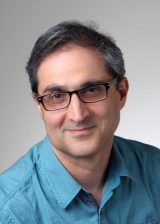Professors Ali Arya (School of Information Technology) and Manuel A. Báez (Azrieli School of Architecture and Urbanism) have been named 2023 Carleton University Chairs in Teaching Innovation for their commitment to teaching innovation and advancing inclusive learning approaches in the classroom.
“On behalf of Carleton University, it is my pleasure to congratulate Ali and Manuel on their outstanding achievement which includes being the first teaching chair recipients from the Faculty of Engineering and Design (FED),” says Jerry Tomberlin, Provost and Vice-President (Academic). “Through this appointment, their work will contribute significantly to advancing Carleton’s excellence in teaching and learning.”
The Chair in Teaching Innovation recognizes educators who have demonstrated teaching excellence and innovation across their careers. Chairs receive a $45,000 grant spanning three years to undertake projects that advance the Scholarship of Teaching and Learning (SoTL) at Carleton.
Using Virtual Reality Technology for Transformative Learning

Professor Ali Arya will use the grant to investigate the potential of virtual reality (VR) in transformative teaching and learning practices, focusing on ways in which instructors can make VR learning experiences more accessible and inclusive.
Despite being widely investigated, VR-based educational activities lack easy-to-use design and development tools for educators to incorporate VR into their courses, according to Arya.
“Despite recent efforts to make VR experiences more accessible and to understand their gender bias, inclusion has generally been an afterthought in the development of VR and other emerging technologies,” says Arya. “A wide range of inclusive issues needs to be investigated: from incorporating Indigenous and other community protocols in the design process to accessibility features compatible with Universal Design for Learning.”
His three-year project seeks to provide instructors across disciplines with guidelines, practices, software tools, and assets to help them incorporate VR into their courses.
Talking Circles: Multi-Cultural Resonances Towards Reconciliation
 Inspired by the relational process of Talking Circles, part of a foundational Indigenous pedagogical approach, Professor Manuel Báez plans to use the funding towards an interdisciplinary project where students can engage with a particular theme or object using a multi-cultural learning process in a respectful listening environment that encourages reflective discourse and introspection.
Inspired by the relational process of Talking Circles, part of a foundational Indigenous pedagogical approach, Professor Manuel Báez plans to use the funding towards an interdisciplinary project where students can engage with a particular theme or object using a multi-cultural learning process in a respectful listening environment that encourages reflective discourse and introspection.
“My teaching philosophy seeks to explore how to expand the awareness and goals of students through their interests, passions, and cultural background. I have found this to be a motivational method that often can reveal untapped sources of inspiration that individual students are not fully aware of until it is allowed to emerge and flourish in unexpected directions for both the student and the teacher.”
Báez’ project builds on a series of explorations conducted as part of different courses within the School of Architecture and Urbanism to expand the teaching experience and goals to a broader diversity of students from across the university.
Additionally, his project aligns with Carleton University’s strategic priorities and Calls to Action included in Kinàmàgawin and contributes to the Indigenous Learning Bundles program.
“I am excited that both Professors Arya and Báez are being recognized through the CU Chair in Teaching Innovation. Their efforts to bring inclusion and cultural awareness through their projects is truly exemplary and cutting edge,” says Vice-Provost and Associate Vice-President (Academic) David Hornsby. “Though their application and topics may appear diverse, they are connected in their ambition to make teaching and learning more accessible, empowering and inclusive. We look forward to seeing the positive change these ambitious projects will bring to the larger Carleton community.”
Arya and Báez bring the number of Carleton professors awarded the Chair in Teaching Innovation to seven. Discover more about the previous recipients here.